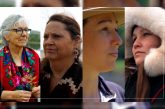
Four Faces of the Moon by Amanda Strong won Best Animation film at Montreal First Peoples Festival | Image source: tiff.net
Présence Autochtone/First Peoples’ Festival wrapped up this week celebrating not only the First Nations and Indigenous presence in and surrounding the city of Montreal, but also those around the world. Rooted as an Indigenous Film Festival, The Montreal First Peoples Festival contintues to screen cutting edge films created directed, produced or focused on Indigenous Peoples. On Monday, August 7, 2017 these films were celebrated at an awards ceremony that highlighted the festival’s best and most creative. MUSKRAT Magazine presents the festival prize winners of Présence Autochtone.
Kuun metsän Kaisa (Kaisa’s Enchanted Forest) by Katja Gauriloff (Skolt Sami)
Sequences Magazine Best Documentary
1st Teueikan Prize (Creation Prize)
Katja Gauriloff is a director and co-owner of Oktober Production Company based out of Finland. Oktober Production specializes in creating deep thinking documentary and fiction films that focus on cutting edge social issues. Kaisa’s Enchanted Forest follows a young Swiss author, Robert Crottet, on a journey with the Skolt Sami as he records their stories and legends from lively Matriarch, Kaisa Gauriloff. Katja Gauriloff, who directs the film, is Kaisa’s great-granddaughter.
Four Faces of the Moon – Amanda Strong (Métis/Cree)
Best Animation
Amanda Strong is a talented multimedia artist and filmmaker based out of Unceded Coast Salish Territory whose works have been screened at Cannes and Toronto International Film Festival. Four Faces of the Moon looks into Canada’s dark colonial past through the eyes of an Indigenous photographer. Strong looks into the effect that the Canadian government decisions, such as the buffalo slaughter and railway construction, had on her ancestor’s history.
Tribal Justice by Anne Makepeace
1st Rigoberta-Menchu Prize (Social Prize)
This prize celebrates hard hitting films that inspire hope and resistance within a social context. Tribal Justice is a documentary about the underreported criminal justice reform movement happening in American tribal courts today. In Tribal Justice, we follow the work of two American Indian judges, Abby Abinanti and Claudette White, and the cases that go through their courts. Instead of punishing the people before them, they look for alternative and innovative justice ways to rehabilitate them based on Indigenous traditions.
God’s Acre by Kelton Stepanowich (Fort Chipewyan)
Best Short Film
Kelton Stepanowich is an up and coming director in Canadian cinema and founder of Half Breed films. God’s Acre stars Lorne Cardinal as a Cree man who faces the tough decision of leaving his ancestral lands due to the impacts of climate change or staying and adapting. The film has been screened on the festival circuit at Toronto International Film Festival and ImagineNATIVE last year.
Alethea Arnaquq-Baril (Inuit) for Angry Inuk
Aboriginal Peoples Television Network Award
This award celebrates an Indigenous filmmaker with special achievements in film this past year. Alethea Arnaquq-Baril in an Inuk filmmaker that specializes in producing films with a focus on the Inuit, their culture and their issues. Angry Inuk highlights the devastating effects that anti-sealskin campaigns, promoted by People for the Ethical Treatment of Animals (PETA) and Humane Society International, have had on the Inuit. The documentary also offers insight into their way of life.
Ukiuktaqtumi by Stephen Agluvak Puskas (Inuit)
Young Hope Main Film Award
Stephen Agluvak Puskas is a visual artist, researcher and filmmaker based out of Montreal. Puskas was asked to produce Ukiuktaqtumi as a response to the highly racist disastrous film “Of the North.” The film is a collage of amateur videos, used with permission, that reflects the diverse Inuit cultures across the Arctic landscapes. Puksas wanted to give an accurate depiction of Inuit culture, not just for people who live in the south, but for the Inuit as well.









